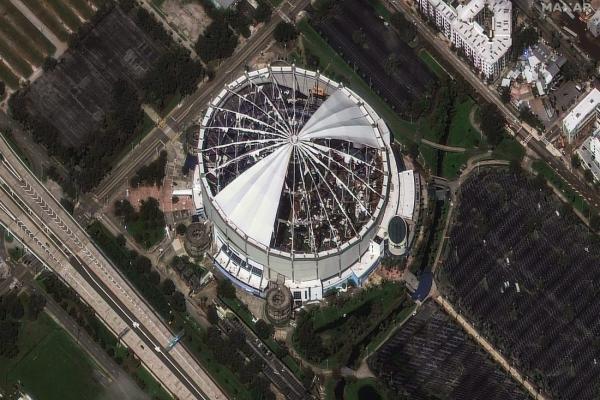The future of the Tampa Bay Rays in Florida is in limbo, with one stadium rendered unplayable by a hurricane and financing for an already planned replacement now in doubt.
Pinellas County commissioners late Tuesday agreed to delay a vote on issuing bonds to pay for its portion of a new $1.3 billion ballpark in St. Petersburg, putting off the vote until Dec. 17. Commissioner Brian Scott, who supports the county funding as outlined in a deal made in July, made a motion to delay the vote because he sensed the issue would go down to defeat on Tuesday.
Two new commissioners elected in the Nov. 5 election are believed to oppose the deal, and they replaced two that had supported it.
“Hopefully that will allow some time for our new commissioners to get up to speed on this,” Scott told the Tampa Bay Times of the delay.
Commissioner Rene Flowers was the lone dissenter in the 6-1 vote to delay the financing discussion, and she told the newspaper that she doesn’t see it passing.
“I just felt that instead of, you know, having additional conversations and taking up time, let’s just be forthright and let’s just put our responses on the table and stand flat-footed,” she said. “I don’t believe that additional time will change their minds.”
The vote previously had been delayed because of Hurricanes Helene and Milton.
The outcome of the meeting left the Rays reeling. Earlier Tuesday, the club delivered a letter to the commissioners, informing them that the current financial terms for the stadium no longer were viable and that a new solution needed to be reached.
In the letter, club presidents Brian Auld and Matt Silverman said the commission’s failure to approve the financing by this point has set back the planned 2028 move-in to the ballpark, forcing the team to halt construction plans for the stadium and surrounding area.
“As we have informed the county administrator and St. Petersburg Mayor Ken Welch, the county’s failure to finalize the bonds last month ended the ability for a 2028 delivery of the ballpark,” the letter read. “As we have made clear at every step of this process, a 2029 ballpark delivery would result in significantly higher costs that we are not able to absorb alone.”
While team officials attended the commission meeting, they made no comment. Instead, they gave their reaction to the latest events in the letter.
“The Rays organization is saddened and stunned by this unfortunate turn of events. We have put in decades of work and spent more than $50 million to bring this historic project to reality — a project that had been approved by the City of St. Petersburg and Pinellas County. Now, that enormous investment of human and financial capital has been jeopardized by the county’s failure to live up to its July agreement.”
Welch, in a statement to the Times, said he believes the July deal is still valid and the city “will continue to work with our partners towards that successful outcome.”
Pinellas County commissioners approved $312.5 million in public financing via a tourist tax in July, funded initially by bonds, but in October delayed the bond vote. The reason given was uncertainty as to where the Rays would play next season after the roof at Tropicana Field was shredded by Hurricane Milton.
The Rays will play their home games in 2025 at the New York Yankees’ spring training complex in Tampa.
“While we are focused on preparing for a unique 2025 season, we stand ready to work on a new solution with any and all willing partners to preserve the future of Major League Baseball in Tampa Bay for generations to come,” Auld and Silverman wrote in the letter.
The next test for the ballpark comes Thursday, when the St. Petersburg City Council is scheduled to vote on selling its own bonds to pay for its share of the stadium, area roads and sewers.









